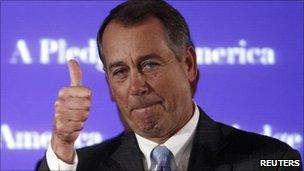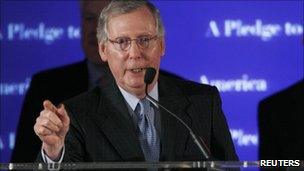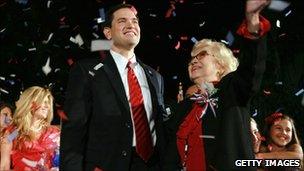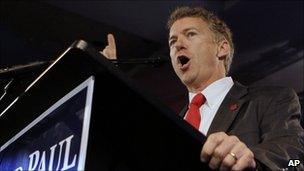How will House Republicans wield their power?
- Published

A teary John Boehner said voters want Mr Obama to "change course"
Now that Republicans have taken control of the House of Representatives and have narrowed the Democrats' advantage in the Senate, one of the biggest questions is: what does this mean for President Barack Obama's agenda?
Just two years ago, in the giddy aftermath of Mr Obama's historic victory, Washington DC pundits were writing obituaries for the modern Republican party.
Now Republicans are back at the table, and what's more, they're holding most of the cards. There are several possibilities for how they'll play them.
Gridlock
The first - and most widely expected - scenario is for Washington DC to return to a state of absolute, fiercely partisan gridlock, a replay of the conflict ushered in by the Republican takeover of Congress in 1994, when Newt Gingrich became speaker of the House and ultimately shut down the government.
With control of the House, Republicans can block any legislation the White House pushes. Although they will not have the numbers to pass any of their own bills through the Senate alone, they can easily cause a stalemate.
Republicans who want to see Mr Obama hamstrung and struggling heading into 2012's presidential election see this as the best option.

Republican Senate Leader Mitch McConnell says his goal is for Mr Obama to be a one-term president
"The single most important thing we want to achieve is for President Obama to be a one-term president," Senate Minority Leader Mitch McConnell said in an October interview, widely interpreted as a signal that he wanted the president's legislative agenda to stall.
Over in the House, John Boehner, the man who is likely to hold the Speaker's gavel come January, said recently in a discussion about his hopes to repeal Mr Obama's healthcare reform bill that "this is not a time for compromise".
Many commentators have taken statements like these to indicate that the Republican resurgence in DC will take existing partisan rancour to a new level.
But the signals from leaders are not so clear as they may seem.
Co-operation
Republican leaders know that if Washington remains a fiercely divided town in 2012, Republicans will shoulder their share of the blame in the eyes of the electorate.
Voters have given them a chance to clear the air in DC, and if they fail to do so, they stand a chance of being punished in the same way Democrats were on Tuesday. The Republican Party's success in this election, disguises the fact that its poll ratings are at rock bottom.

Florida Senator-elect Marco Rubio is a conservative who has worked with Democrats in the past
The influx of new members could also alter the dynamic in DC. New representatives may want to get the legislative wheels rolling so they can tout achievements in their home districts.
And although there are several extremely conservative, possible spoilers coming to DC - such as Pat Toomey from Pennsylvania and Rand Paul from Kentucky - some in this new crop of lawmakers are actually experienced politicians and skilled negotiators.
Rob Portman, the freshman senator from Ohio, formerly worked as President Bush's chief trade negotiator. He is likely to work hard to form consensus on issues important to his rust-belt constituents, like trade and energy policy.
Florida's new senator Marco Rubio is a bona fide conservative, but has earned a reputation in the Florida House of Representatives for working across party lines to get results. He could potentially become a pivotal voice, for example, in the debate over immigration, which is a huge issue in Florida and one that the Democrats want to deal with in order to appease Hispanic voters before 2012.
New faces like Mr Portman and Mr Rubio, along with freshman senators like former Republican whip Roy Blunt and former congressman John Boozman, may contribute to a second scenario where - with their eyes firmly on 2012 - both parties usher in new era of co-operation out of a desire to look productive to voters.
Even Mitch McConnell has indicated that co-operation may be possible under certain conditions.
In the same interview that he said he wants to make Mr Obama a one-term president, he stated that if Mr Obama "is willing to meet us halfway on some of the biggest issues, it's not inappropriate for us to do business with him".
But there is an elephant in the room with each of these scenarios: the Tea Party.
Unpredictability
The Tea Party gives rise to the third scenario: complete unpredictability.

Tea Party members like Rand Paul may not play ball with Democrats or Republicans
For starters, many Tea Party candidates - including Mr Paul - are not seasoned politicians. They don't have long records which can be extrapolated to anticipate their voting behaviour.
Nor do they necessarily know how to work the corridors of power in DC to their advantage.
Often freshman representatives can be relied on to fall in line with party leaders. But this crop didn't get nominated by being dyed-in-the wool Republicans. They got their positions by professing disdain for both parties, and with "politics as usual".
For them, becoming reliable Republican foot soldiers could be as damaging as occasionally voting with Democrats. So they could end up forming an unpredictable swing group, lobbied by both parties.
Alternatively, they may bring Republicans and Democrats closer together, forcing them to negotiate because if neither mainstream party can count on the Tea Party caucus votes, they're going to need each other if they are to get anything done at all.
Whichever scenario plays out - gridlock, co-operation or unpredictability - one thing is for sure: the American electorate is fed up with Washington and they are unafraid to dole out punishment regardless of party.